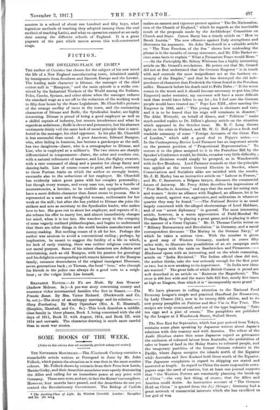FICTION.
THE DWELLING-PLACE OF LIGHT.•
TEE author of Coniston has chosen for the subject of his new novel the life of a New England manufacturing town, inhabited mainly by immigrants from Southern and Eastern Europe and the Levant. The leading male character is Ditmar, the manager of the chief cotton-mill in "Hampton," and the main episode is a strike con- trived by the Industrial Workers of the World among the Italians, Poles, Czechs, Syrians, and other aliens when the manager reduces the standard wage as a set-off to the reduction of the working week to fifty-four hours by the State Legislature. Mr. Churchill's picture. of the strange medley of races in the town, and the contrasting characters of Ditmar and Rolfe, the Syndicalist leader, are highly interesting. Ditmar is proud of being a good employer as well as a skilful captain of industry, but resents interference and what he regards as unfairness ; Rolfe is clever and persuasive, but his abstract sentiments thinly veil the same lack of moral principle that is mani- fested in the manager, his chief opponent. In his plot Mr. Churchill is less successful than usual. A poor American, Edward Bumpus, who, after failing in business, has become a gatekeeper at the mill, has two daughters—Janet, who is a stenographer to Ditmar, and Li., who is employed at a milliner's. The two sisters are sharply differentiated in temperament—Janet, the sober and resolute one, with a natural refinement of manner, and Lisa, the flighty creature, with a rare command of slang and a passion for cheap finery and dancing-halls. Lisa of course comes to grief, and Janet, contrary to those Puritan traits on which the author so strongly insists, succumbs also to the seductions-of her employer. Mr. Churchill has evidently taken great pains with her complex personality; but though every woman, and every man too, may be a bundle of inconsistencies, a heroine, to be credible and sympathetic, must have a more definite character than Janet seems to possess. She is represented as a sane and thoughtful woman, enthusiastic for her work at the mill ; but after she has yielded to Ditmar she joins the strikers and acts as secretary to the Syndicalist leader, who makes love to her. She goes out to shoot her employer, and repents of it ; she refuses his offer to marry her, and almost immediately changes her mind, when it is too late. She wanders away in the company of some vaguely outlined philanthropists, and begins to underetand that there are other things in the world besides manufactures and money-making. But nothing comes of it all for her. Perhaps the author was anxious to avoid a conventional ending ; perhaps, by implication, he meant to suggest the futility of a life in which, for lack of early training, there was neither religious conviction nor moral purpose. Some of his minor characters are definite and entertaining, such as old Bumpus, with his passion for genealogy and hie delight in correspondingwith remote kinsmen of the Bumpus family, common descendants of the original immigrant Ebenezer, seven generations back ; or Tiernan, the local '• boss," who through his friends in the police can always do a good turn to a neigh- bour; or the vulgar little Lise herself.














































 Previous page
Previous page